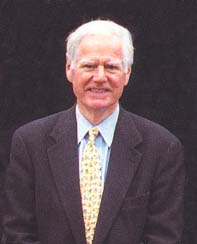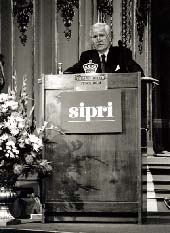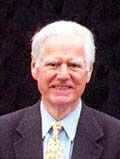 |
Sir
Marrack Goulding Warden of Saint Anthony´s |
"By persuading the Americans
that in this globalizing world there are few problems that can be resolved
by a single state acting on its own, even if that state is the most powerful
state in the world"
Josemari
Velez de Mendizabal
Itzulpena euskaraz
Sir Marrack Goulding of St Anthony’s College at the University Oxford is an expert in the field of international politics. We have contacted him in order to find out more about the role that the new Europe could play within the framework of international relations. According to Goulding, the new European Constitution should be based on a desire to integrate the member states, although, unfortunately, this desire does not seem particularly prevalent at the moment. As regards armed conflicts, in addition to those taking place in Africa and the Near East, Marrack is also concerned about the situation in the Balkans, since, in his opinion, the international community has not paid enough attention to ensuring a negotiated solution.
In your opinion, what influence could the platform offered by the new European Constitution have on the balance of world power?
The world balance of power will not have a significant impact on the success or failure of Europe’s effort to achieve a European Constitution. Indeed the whole concept of a balance of power has been superseded by the emergence of the United States as the sole superpower. America wants a Europe that shares America’s values and objectives, accepts American leadership and will strengthen its military capacity so that it can be a more effective ally for America. Russia’s views are less clearly defined and more defensive; its main concern is that an integrated Europe should not constrain Russia’s ability to promote its own interests in the world. China is largely indifferent to the European project.
The basis for a European Constitution must be the common will of the member states of the European Union to take a major new step towards European integration. That will does not at present exist. It is unfortunate that efforts to create it have been launched at a time when the Union is trying to cope with the upheaval generated by a massive enlargement.
How is Europe to co-exist with the lone superpower?
Europe can co-exist with the United States by responding to America’s expectations of Europe, as mentioned above. Some European leaders have been ready to do that. But others have not. They are not prepared to accept a relationship in which the United States unilaterally dictates policy, especially when its policy is so heavily based on the use of military force and it is so disdainful of multilateral co-operation. Co-existence will be achieved only if Europe and America have a better understanding of each other’s concerns and each adjusts its policies and rhetoric accordingly. That is unlikely to happen during the tenure of the present Administration in Washington.
 How
can we and the US co-operate in promoting the values which we have in common?
How
can we and the US co-operate in promoting the values which we have in common?
First, by respecting the values. If we say that the promotion of human rights is one of our common values, we must all be seen to be respecting human rights. That is not the case at present, as evidenced by Guantánamo Bay and other policies generated, in America and elsewhere, by the so-called “war on terror”. Secondly, by agreeing both on the rewards we will offer those who share and promote our values and on the penalties we will impose on those who do not. If Europeans and Americans squabble over the values and how they should be put into practice, both the values and we lose credibility.
How can we persuade the USA to adopt the multilateralist approach which we Europeans favour?
By persuading the Americans that in this globalizing world there are few problems that can be resolved by a single state acting on its own, even if that state is the most powerful state in the world. The Bush Administration’s expectations of what it could achieve by “shock and awe” in Iraq proved to be deeply flawed. The armed resistance which it now faces is the standard reaction to illegal occupation by an unpopular and trigger-happy foreign power, as Israel has found in Occupied Palestine. If the Americans and their allies had followed the multilateral path and obtained authorization from the Security Council for the use of force to achieve purposes approved by the Council (as Bush’s father did in 1990-91) they would have avoided the mess in which they now find themselves.
One of the few cheerful elements in today’s grim world is that a majority of the American people consider the United Nations to be a useful institution, not because they think it can ensure their security (they rely on their country’s armed forces for that) but because it provides a multilateral forum where states can cooperate in removing external threats to the health and prosperity of their peoples, such as international crime, drugs, infectious disease, abuse of the environment and uncontrolled migration. The United States itself is vulnerable to these threats. Participation by it in multilateral efforts to deal with them would help to close the gap between American and European perceptions of what multilateral cooperation can achieve.
What does the likely emergence of China as a superpower imply for US-European relations?
This is a difficult question, because the variables are so many. At one end of the spectrum, there is the possibility (a very unlikely one, in my view) that China will become a major military power and seek to be the exclusive hegemon in East and South East Asia, as Japan did in the 1930s. In that event, Europe and America might work together to constrain Chinese hegemony and protect their joint interests. At the other end of the spectrum, China, as an industrialized market-economy state could align itself with other such states. In that case too, Europe and America would have a common interest in ensuring that their relations with China were harmonious and mutually beneficial.
 Will
the Pacific become a more important “pond” for the Americans than
the Atlantic?
Will
the Pacific become a more important “pond” for the Americans than
the Atlantic?
Perhaps it already is, precisely because of the uncertainties about the kind of country China will be a few decades from now. During the Cold War we Europeans saw the Atlantic as the more important pond because of NATO and the perceived threat of a Soviet attack on us. But for the United States during that period, there were perceived threats across both ponds. In the future, the relative importance of the Pacific to the United States will be primarily determined by the evolution of Sino-American relations, as discussed above.
How will Russia fit into the emerging new balance (or imbalance?) of power?
The answer to this question too depends on the role which an evolving China decides to play in the world. At one end of the spectrum, efforts by China to establish itself as the hegemon in the eastern parts of Eurasia could revive territorial disputes and undermine Moscow’s ability to maintain effective control over its eastern extremities. In those circumstances, Russia would have reason and opportunity to strengthen its ties with Europe and America in a joint effort to contain China’s ambitions. At the other end of the spectrum, an industrialized and market-led China, enjoying a harmonious relationship with Europe and America, would give Russia a strong incentive to join that club. An alternative, but not an attractive or likely one, would be for Moscow to become again the champion of the developing countries in their relations with the developed world.
Is our world today a more peaceful place or, on the contrary, are territorial imbalances driving us towards continuous armed conflict?
Territorial imbalance between major powers is unlikely to be a cause of war. If a conflictive relationship develops amongst two or more of them, nuclear deterrence will probably prevent any direct armed conflict. The Cold War phenomenon of proxy wars might, however, reappear, with one major power funding and arming its allies in the Third World to protect its interests against the allies of another major power.
But there is a major risk that armed conflict will continue on a large scale in some regions of the world, notably Africa but also the Middle East and the Balkans, where open societies do not exist, governments are weak and corrupt and populations are divided on ethnic or religious lines. This will remain a real threat until the international community, led by the major powers, understands better the causes of such conflicts and becomes more successful in preventing, managing and resolving them.
 Sir
Marrack Goulding
Sir
Marrack Goulding
Sir Marrack Goulding KCMG, MA was elected Warden of St Antony's in 1996 and
took up his position in October 1997.
Marrack Goulding was born on 2 September 1936 in Plymouth, England. He was
educated at St. Paul's School, London, and Magdalen College, Oxford, where
he received First Class Honours in Literae Humaniores (Greek and Latin Language
and Literature, Ancient History, Greek and Modern Philosophy).
He joined the British Diplomatic Service in 1959 and, after learning Arabic
in Lebanon, served as Political Officer and later as Information Officer at
the British Embassy in Kuwait from 1961 to 1964. From 1964 to 1968, he worked
in the Foreign Office in London, first in the Arabian Department (1964-1966)
and then with the Planning Staff (1966-1968). He was then posted to Tripoli,
Libya from 1968 to 1970 as Head of Chancery at the British Embassy there.
He occupied the same post in the British Embassy in Cairo from 1970 to 1972.
From 1972 to 1974, he was Private Secretary to the Minister of State for Foreign
and Commonwealth Affairs in London. From 1975 to 1977, he served with the
Central Policy Review Staff at the Cabinet Office, London, working mainly
on British overseas representation, international energy questions and housing
policy.
He was Counsellor at the British Embassy in Lisbon from 1977 to 1979, before
being posted to New York as Counsellor and Head of Chancery at the United
Kingdom Mission to the United Nations from 1979 to 1983. His last post in
the British Diplomatic Service was as British Ambassador to Angola and concurrently
to São Tomé and Principe, from 1983 to mid-1985.
After spending a sabbatical term at St. Antony's College, Oxford, he was appointed
by the Secretary-General of the United Nations, Javier Pérez de Cuéllar,
to the post of Under-Secretary-General for Special Political Affairs with
effect from 1 January 1986. In Secretary-General Boutros-Ghali's restructuring
of the Secretariat in February 1992, the title of his post was changed to
Under-Secretary-General for Peace-keeping Operations. In both posts he was
responsible, under the Secretary-General, for the peace-keeping operations
of the United Nations in which by 31 December 1992 some 55,000 military, police
and civilian personnel were deployed in thirteen operations, with an annual
budget of some $2.7 billion. He also undertook a number of special missions
on behalf of the Secretary-General, especially to the Middle East, the former
Yugoslavia and Central America.
With effect from 1 March 1993 he was appointed to the post of Under-Secretary-General
for Political Affairs in which his main responsibility was for the Organization's
preventive diplomacy and peacemaking activities throughout the world.
In November 1996 he was appointed Warden of St. Antony's College, Oxford with
effect from 1 October 1997. He left United Nations service in July 1997.
He has served for some years on the Boards of the Stockholm International
Peace Research Institute (SIPRI), the International Peace Academy (New York)
and Cedar Crest College (Allentown, Pennsylvania) and previously on that of
the United Nations International School (New York). He received an Honorary
Doctorate (Social Sciences) from the University of Southampton, England in
1997. In the same year he was appointed Knight Commander of the Order of St.
Michael and St. George (KCMG). In 1998 he was appointed to the Advisory Council
of the new Foreign Policy Centre established by Mr Robin Cook, the Foreign
and Commonwealth Secretary.
euskonews@euskonews.com
